Understanding the Difference: Vapor Vs. Liquid Propane Leaks
Sep 22, 2023
Tyler Oberender
Propane Operations & Service Leader
Your home, building or grain bin uses propane in one of two ways: vapor service (vaporized propane) or liquid service (liquid propane/LP).
Propane is most commonly used in vapor form, especially for home heat. Vapor service requires that your system have a regulator.
Propane used in liquid form is typically for grain drying. Many grain dryers use liquid propane so the system can carry a large heat volume.
Propane in liquid form must be vaporized in order to burn. A coil inside the dryer can vaporize the liquid propane (LP) or a propane vaporizer can be used. A vaporizer works like a water heater – liquid propane comes into the tank, a burner in the vaporizer heats the propane, and it becomes a vapor state. Liquid service allows for much larger loads of propane to be delivered. It also requires smaller piping because propane expands so much from liquid to vapor; typically a small copper line feeds the vaporizer and larger piping feeds the dryer.
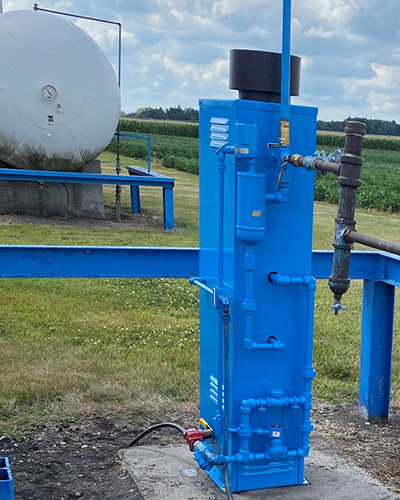
Propane vaporizers are often used at grain drying or commercial facilities.
Propane tanks are equipped with different valves or ports for liquid and vapor services. Be aware that both can have leaks - these leaks look different and should be handled differently.
Vapor leaks may create bubbles when wet or sprayed with soapy water/leak detector. These leaks may also appear as a haze and accumulate flies.
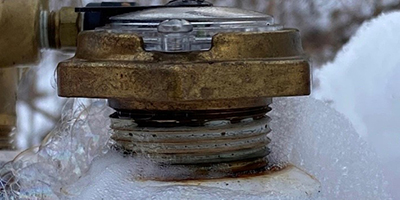
Vapor leaks create bubbles with soapy water/leak detector.
Liquid leaks usually create a “snowball” or “stream” on the tank and typically smell worse than vapor leaks. Extra caution is required when handling liquid propane. When exposed to air, it's extremely cold and can “freeze” or burn your skin.
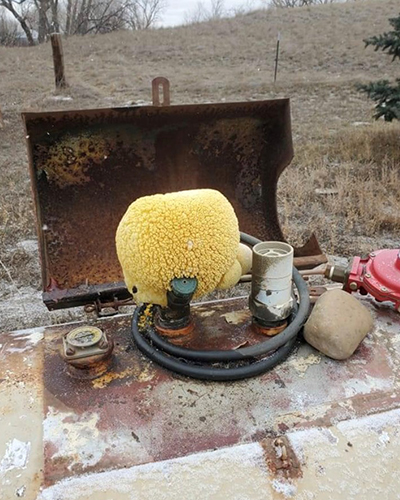
Liquid leaks often create a “snowball” on top of the tank.
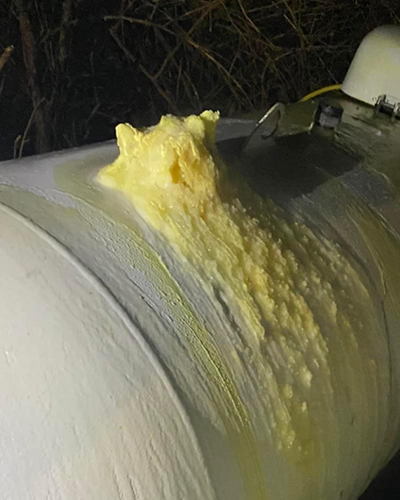
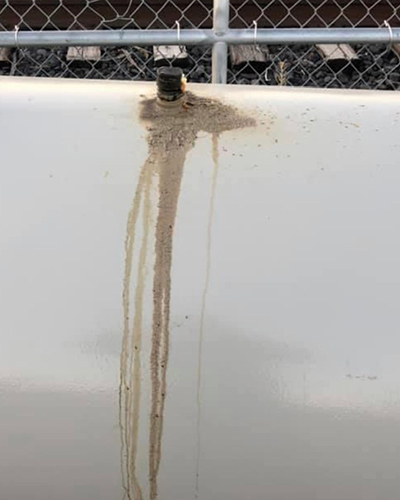
Liquid leaks can also leave streaks or “streams” on the tank.
If you see, smell or hear a propane leak, report it immediately by calling our 24-hour hotline at 800-469-1040. In an emergency, always dial 911. To better understand your propane system or for assistance from our certified service technicians, please call the Key Cooperative Energy Team at 800-469-1040.
Propane Operations & Service Leader
Your home, building or grain bin uses propane in one of two ways: vapor service (vaporized propane) or liquid service (liquid propane/LP).
Propane is most commonly used in vapor form, especially for home heat. Vapor service requires that your system have a regulator.
Propane used in liquid form is typically for grain drying. Many grain dryers use liquid propane so the system can carry a large heat volume.
Propane in liquid form must be vaporized in order to burn. A coil inside the dryer can vaporize the liquid propane (LP) or a propane vaporizer can be used. A vaporizer works like a water heater – liquid propane comes into the tank, a burner in the vaporizer heats the propane, and it becomes a vapor state. Liquid service allows for much larger loads of propane to be delivered. It also requires smaller piping because propane expands so much from liquid to vapor; typically a small copper line feeds the vaporizer and larger piping feeds the dryer.

Propane vaporizers are often used at grain drying or commercial facilities.
Propane tanks are equipped with different valves or ports for liquid and vapor services. Be aware that both can have leaks - these leaks look different and should be handled differently.
Vapor leaks may create bubbles when wet or sprayed with soapy water/leak detector. These leaks may also appear as a haze and accumulate flies.

Vapor leaks create bubbles with soapy water/leak detector.
Liquid leaks usually create a “snowball” or “stream” on the tank and typically smell worse than vapor leaks. Extra caution is required when handling liquid propane. When exposed to air, it's extremely cold and can “freeze” or burn your skin.

Liquid leaks often create a “snowball” on top of the tank.


Liquid leaks can also leave streaks or “streams” on the tank.
If you see, smell or hear a propane leak, report it immediately by calling our 24-hour hotline at 800-469-1040. In an emergency, always dial 911. To better understand your propane system or for assistance from our certified service technicians, please call the Key Cooperative Energy Team at 800-469-1040.